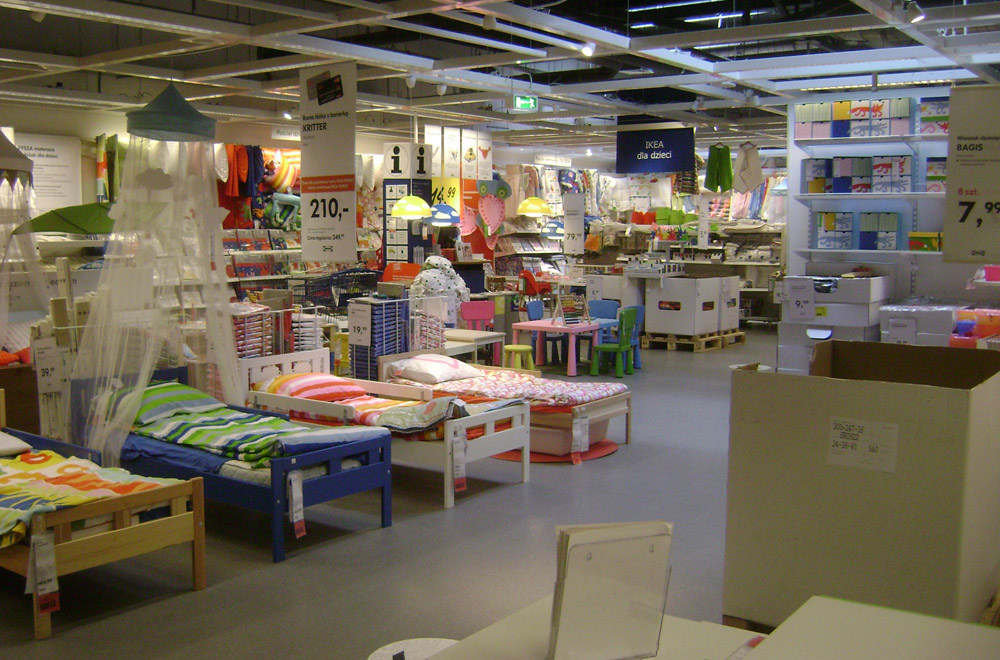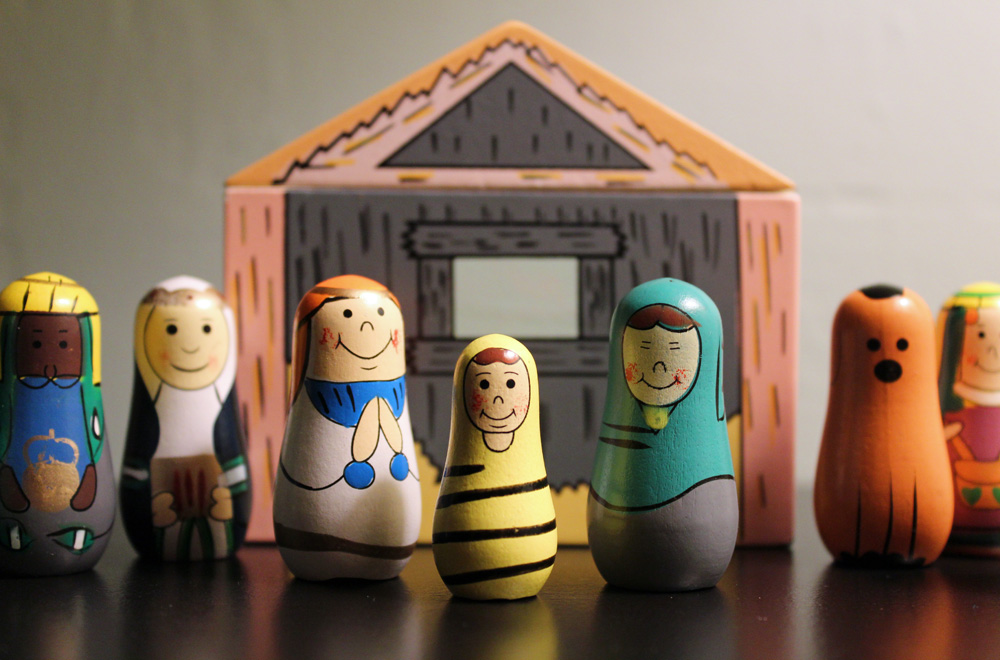
The interior of an Ikea store in Janki, Poland (Wikimedia Commons/Albert Jankowski)
With romanticized nostalgia, the holiday troubadours tell us, "There's no place like home for the holidays." With blunt but slick marketing, the international furniture store Ikea tells us, "For a third of us, home doesn't even feel like home anymore."
According to Ikea's surprisingly existential annual Life at Home Report:
- 29 percent of people don't feel at home where they live;
- 45 percent of Americans go to their car – not their home – to have a private moment;
- 53 percent of young families don't get a sense of belonging from their residential space;
- 33 percent of respondents don't feel their residence provides a sense of security;
- The five core needs identified for feeling at home are privacy, security, comfort, ownership and belonging.
And so, as I hold this information, I wonder: What if, instead of Ikea, it said the Catholic Church? What if, instead of a residential space and a sense of belonging, it was the parish church and a sense of belonging? I suspect that it's not just a growing number of Americans who don't feel at home in their home, but a growing number of Catholics who don't feel at home in their church; after all, we continue to bleed more adherents annually than any other Christian denomination. With these results, I also wonder if Ikea should sell some Dante inspired merchandise. A circular "All hope abandon, ye who enter here," door mat seems appropriate.
At 10 a.m. on Sunday mornings I survey the approximately 300 people around me at St. Barnabas Catholic Church. I wonder how many people in the pews with me here don't feel spiritually at home? How many of the people around me have a better prayer experience in their cars than they are having in our 50 minutes together? How many of the young families don't have a sense of belonging in this parish? How many fellow parishioners do not feel safe in this space? Are not the five core needs identified by Ikea to engender the feeling of home — privacy, security, comfort, ownership and belonging — similar or potentially identical to the core needs of a Catholic to feel at home in their parish or, more generally, the universal church?
Are there not, yet to be empirically tested, correlations between young adults who report the highest percentages of not feeling at home in Ikea's survey with the percentages of young adults who leave their spiritual home, the church? And then I think, that premise is probably wrong. For most of my generation, and those younger than me (I am 30 years old), they really are not leaving the church vis-à-vis their spiritual home because, in my experience and anecdotal evidence, they never saw or experienced the church as a home.
Beyond belonging and ownership, a home offers a place to make memories — happy ones at that. We now live in an increasingly mobile, transient world where renting, not home ownership, is increasing. When we move, do we register at the new local parish? For people who just "went home" for the Thanksgiving holiday, what space did they go to? A relative's house perhaps. If they went home to Mom and Dad's, do Mom and Dad still live in the house the young adult grew up in? And how could memories be made, good or bad, at the parish church, or even seem like a home, if the frequency of one walking into that building was approximately twice per year? Here's looking at you CEO (Christmas-and-Easter-Only) Catholics. Speaking of Christmas, whether it's in a studio apartment, third-generation family home, or parish church, I'm reminded how middle-class my thinking is when I look at the crèche or Nativity scene. Certainly, the Holy Family didn't exactly have a homey entrance for the Prince of Peace with the whole manger location, and flight into Egypt slightly thereafter.

Author's photo of his daughter's Nativity scene (Mark Piper)
A noisy family home AKA the domestic church should be a great and realistic analogy for the parish church; after all, the first Christians' homes were also their houses of worship. People in your home know who you are and love you for who you are, and they should push you to be better. There may be arguments but they ought to be respectful. There are mentors at home, siblings or parents who you might see regularly and the observed hospitality of inviting guests, both newcomers and regulars. Lessons taught, stories told, bonds formed, love observed in addition to the unsavory messiness of hectic schedules, bad days, miscommunication and lack of listening, family crises, tragedies and mundane chores. How can that happen in our faith communities if just 20 percent of the family gets together but for one hour per week?
Of course, spending little time at one's spiritual home is a Catch-22. People may not go because they don't feel at home; they may not feel at home because they never go. There are also people, regardless of age, who, perhaps by default, viewed the neighborhood parish as their spiritual home; but they still leave it to either go parish-shopping elsewhere or leave the church permanently. The family home and the parish church are similar because they are the places we are called to, where we find respite, before we are sent back into the world to live our daily lives.
Estrangement from family and from the church can come from many things, though it seems evident that hypocrisy, inhospitality, bad experiences, abuse of power, and scandals wrought by rage-inducing criminality clearly play a role. Whatever came of that "Catholics Come Home" initiative? I haven't heard much about it, and I suspect that despite some decent funding and high production-value videos, it's been relatively unsuccessful. After all, why would someone come back home if the reasons they left home in the first place have not acknowledged, improved or somehow addressed? We can buy every knickknack store's "As for me and my house, we will serve the Lord" decorative art pieces, but just because a Bible verse is on wall art doesn't mean that mandate is lived out within the wall it hangs from.
Ikea's marketing seems to come from Isaiah 38, for they are here to help put your house in order. Is it not time that the church and each of its parishes put their houses in order? How can anyone care to grasp being welcomed into the Father's house (also Isaiah 38 as well as John 14:2) if we have no spiritual home nor any literal place of our own where we feel at home?
Ikea's report website includes a five-question quiz. That quiz produces a manifesto for me about my feelings about home, and what I might do to build a better home community because, it says, "Everyone deserves to experience that feeling of home." Borrowing language from Dorothy Day, I have felt, since probably high school, that my personal manifesto in faith was the Beatitudes. And so, as my wife and I raise our children in our home and almost inexplicably take them to Mass each Sunday, we hope that the four of us experience in the parish church and our domestic church a sense of privacy, security, comfort, ownership and belonging, as taught by Christ in the Beatitudes.
Advertisement
The image of a home is pervasive in Scripture and the image of home seems to resonate with our psyches. Jesus was quite clear that His father's house awaits, but that here on earth, a house divided among itself cannot stand (Mark 3:25). When I'm not on the road, more likely than not I am the one putting our 4-year-old daughter to sleep. Pajamas, brushing teeth, two books, evening prayers, and a song or two. In between the prayers and the songs, I do a quizzical call-and-response with my daughter to teach basic information.
For instance, I'll ask, in what city do you live, and she'll respond. I'll ask on what street, and she'll respond, and then I'll ask at what address, and she responds. Sometimes there are more questions, but always, always I end with asking, where are you? And the response I suggested, and the one she recites without fail every evening is, "I am safe and loved, at home."
She says, "I am safe and loved, at home," and then we hug or cuddle good night. She says it with conviction because, I believe, she honestly feels safe and loved in her house. I mention this because the salvific mission of the church and the salvific ministry of the family, the domestic church, is about space and relationships. You cannot divorce the intertwined reality and necessity of both space and relationships when it comes to creating a home — in your house or in your parish.
Buildings and addresses may change, rooms might be redesigned, but the distinct space of a home — spiritual and material — has a distinct purpose that cannot be realized unless people are invited in, unless people are safe, unless people are loved. Be invitational, be welcoming, turn love into a verb, and keep people safe, because — as we learned from Ikea — people do not feel safe or at home, at home. Christ uttered the Beatitudes, and I contend that they are the key to not only building the kingdom but to ensuring all people feel at home in our families, in our communities and in our church.
[Mark Piper, a Packers fan in an unholy land, works in the nonprofit sector. He resides in Chicago with his family and holds a master's in public policy from DePaul University and a bachelor's from Saint Xavier University; he is an alumus of Amate House, an AmeriCorps-approved year of service organization sponsored by the Chicago Archdiocese.]
Editor's note: We can send you an email alert every time a Young Voices column is posted to NCRonline.org. Go to this page and follow directions: Email alert sign-up.







